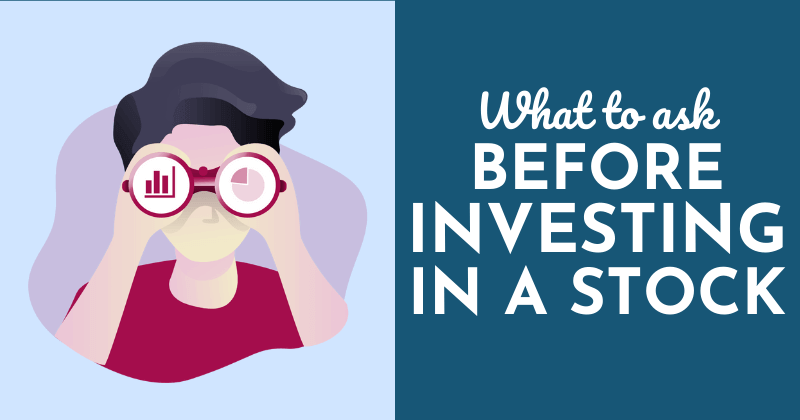15 Questions To Ask Before Investing In A Stock

This article may contain affiliate links. If you make a purchase using my links, I’ll earn a small commission at no extra cost to you. I appreciate your support!
Don’t we all want to make awesome returns on our investments? To do that, you need to do your homework about a company and its financials.
The main goal while investing is to minimise risk and maximize returns. People say it’s almost impossible to invest in a company that won’t disappoint you, it’s all luck and no logic, but that’s not true.
In this post, we are going to discuss 15 questions that you can answer so that you can logically invest in companies and make sure it will give positive returns! Let’s get started!
15 Questions To Ask Before Investing In A Stock
1. What Work Does The Company Do?
What does the company do? What does it sell? Does it sell a product or a service to its clients? Who are its clients, is it a B2B business or a B2C Business?
How does the company make money and support all the people who work for the company? These are some basic questions you should know about the company.
Some businesses sell multiple products, you may know the company by looking at its showcase products but 70% of the company’s growth may be in Curtains & Sofa products.
Identify what is the core business of the company and figure out if these products are nearing obsolete. If they are, a huge chunk of profits may also be wiped out of the company.
2. How Was The Past Performance Of The Company?
How has the company performed in the past 5 years or 10 years? Are the returns stagnant or is there steady growth or negative returns are a common problem in the company?
The simplest way used by investors to trust a company is by looking at its past performance. When did the company have its highest and lowest numbers, what caused that in the past, how are sales, cash-free reserves.
Analysing past performance also gives you quality information on various financial metrics which you can use to determine the value of the stock in the market.
3. Who Are The Top 5 Competitors And What’s Their Market Share?

Who are the competitors? What do they do differently that makes them a competitor? Do your analysis, collect graphs and details, and see if the company you were planning on investment is worth it or not.
Sometimes you’ll find that the competitor company is far better than the company you wanted to invest in. Find out the market share of the competitors. Doing a competitor analysis will help you predict the future of the company.
4. Who Runs The Company And Who Are The Board Of Directors?

There are plenty of ways to find out the people that run the company and the board of directors of that company.
Any legal sensible company will always declare the people working at the top levels on their official website. A quick google search will help you find it. The last thing you want is any member of the core team to do illegal things.
If anyone in that list has a bad track record, it’s wise to not step into that business. And if you still don’t know anything about such individuals, Google their name and articles on them will show up.
5. What Is The Worst-Case Scenario For The Company/Industry?
You’ve got to find the company’s weak spot. What is it that they’re lacking in, can they save themselves if something goes wrong tomorrow?
See how well your company has responded when the market is down, few companies continue to grow even when the stock market is crashing, is this company one of those?
Changing laws and regulations regarding sectors your business deals in are a few things you could keep in mind.
Do your Competitors have a patent and can sue your company? You’ve got to look at how the company performs during pressure.
6. Does The Company Involve Itself In Illegal Business Practices?
Many companies happily involve themselves in illegal business practices. These aren’t acceptable but they do it anyway. Most of these businesses keep their secrets hidden and thus common men don’t know about such malpractices.
But sometimes information slips, and if you get to know about illegitimate work done by your company, staying away and not investing your money in these stocks is a wise option.
The easiest way to identify these companies is by asking your friends and family about the company’s practices, rumours are usually not true but a rumour today can be a reality tomorrow and the stock can give a yearly return of 12% will now give you negative returns and the company will be insolvent.
7. How Much Debt Does The Company Have (Balance Sheet)
An ideal business must have more assets and fewer liabilities. An asset is something that will generate money whereas a liability takes money out of a business.
Company’s need to grow fast, thus having liabilities in their balance sheet is understandable but liabilities should be limited. Does the company have enough cash to pay off its debts?
And if it does have cash, why isn’t it paying it off? Too much debt will have short term and long term financial problems.
You may invest in the pink stocks of the company after seeing amazing sales but if there’s too much debt, the company is very close to filing for bankruptcy. When you see sales being high, profits low and debts high, understand that the business has high risks involved!
8. Does This Company Have A Competitive Advantage In The Market?
Does the company have a secret jewel that no other company in that industry possess?
If a company has a unique distinguishable feature that no other company can provide, it’s value will always be high in the stock market.
For example, Apple’s iPhone cannot be replicated and hence is a competitive advantage over all other android phones in the market.
When doing smartphone analysis, it’s always iPhone vs All smartphone brands (Samsung/OnePlus/Moto/Google). So dig deep to see if the stock you’re eyeing has such an advantage, if it does, you can buy the stock and reduce your stress levels.
9. Is The Company Spending Money On R&D?
How does R&D help you to get more returns? If the company created a new product or service out in the market that is better than their last product, their sales will increase and this will increase their stock prices dramatically.
What does that mean? More money in your pockets. Every company must spend some money on research and development, that way they can stay ahead of the competition.
More products mean more money for the company and more money for you!
Check their balance sheet and other financial sheets to see whether they spend or not.
10. Does the Company Give Dividends and Bonus Shares To Its Shareholders?

A key factor that determines whether the company is a good investment is by looking at its past performance in terms of dividends and bonus shares.
Does the company give dividends to its shareholders? Does the company issue bonus shares? These things act like incentives for an investor.
Investors love to get passive income from dividends, so by looking at the company’s past performance and their consistency of paying dividends, you can decide if the company is good or not.
11. What Do You Like About The Company?
Why? Out of 100 other companies, you could invest your money into, why this company? What’s so special about this? It’s time to Find Your WHY.
Think about what’s good in the company, you’ll get a few pointers just by answering the questions in this blog post, the rest is your research about the company.
Also don’t invest in stocks of companies you don’t understand, if you do not know about the Tech Sector, you’ll end up making more mistakes. Invest in what you already know, the number of mistakes you’ll make will reduce.
12. Can I Take On This Amount Of Risk?
All signs and reasoning state that this stock will only go up, you’re all set to invest a substantial amount of money to buy those stocks.
But even though research says positive returns are highly possible, the result can always go the other way.
The simple logic is – The higher the returns, the higher the risk. If you see an upward graph, there is a high possibility for that graph to touch the ground. As an investor, such stocks should only be traded in the short term, keeping these stocks for the long term may give a bad ROI.
My first two stocks were of the same company, I had done my research and it was the best company I knew, so I assumed that I’ll make unbelievable profits.
Honestly, it showed an upward trend where I could have made about 23% if I sold but I didn’t sell and wanted to get more returns, as of this moment the stock price is lower than I paid for it. This means ‘All That Glitters Is Not Gold’.
13. Can your rational thinking overrule your emotions?
Emotions are the root cause of investors going broke. Emotions play a vital role in generating profits or losses for your portfolio.
Investing is an emotional game but rational strategic thinking is more important compared to playing the game with emotions.
It is emotions that force you to sell stocks even when the market falls by 2%. Using rational thinking to decide if an investment is an appropriate investment is a smart way to invest.
14. Will This Company Be Around In 15 Years?
After asking and answering the above questions, I’m sure you have a pretty good idea of the company you’re planning to invest in. Now you got to think about the company’s future.
Will it sustain in the market? Especially due to digitalisation, will the stock price of the company take the downfall? Investing is a long term game, if you want to invest short term, the only way that works is by buying low, selling high or selling high and buying low.
Companies that sell products/services essential to our lives will never be obsolete. So investing in them is the right choice whereas there are a few trendy companies, maybe their marketing strategies aren’t that great or they have too much debt and in a few years, they may be done!
Maintaining distance is the best option in such situations. According to CNBC, if you would have invested in Amazon 10 years ago, your return would be 1232%!!! I’m happy with that return on investment, are you?
15. Is The Company Profitable?

This should be your first question not the last! I’ve added this at the end cause you shouldn’t forget this point!
Check if the company has made profits in the past few years. How much percentage of profit does the company make each year?
Most importantly, are the profits of the company increasing or decreasing or is it stagnant?
For example, if the company made X profits in 2019 and even in 2020 it made X profits, it should have made X + Y but it made X, this means profits are stagnant. When you’re investing, your goal is to look for companies where profits are increasing each year.
Try avoiding the stocks that give decreasing returns. Stagnant returns aren’t bad, they’re less risky and safer as returns are predictable.
What Are The Top 15 Questions To Ask Before Purchasing Stocks?
It’s safer to have a stock market strategy rather than entering the market blindly.
These questions will help you make better decisions and will make you smarter.
Just by following these questions, you’ll be able to eliminate 85% of companies, leaving you with the best stocks of the best companies with risk appetite that matches your investments!
If you found questions that I haven’t mentioned in this post, feel free to comment and I’ll add it to the post ASAP!
Have you enjoyed this post? If so, you might want to subscribe to my newsletter. It usually contains life lessons and money-related topics, some interesting observations, links to articles or books I’ve read, and tips to be a better person. If you’re interested in these things then subscribing will be simply wonderful 🙂 PS: Subscribe and Get your Freebie below!
Also, I’m a YouTuber now! If you’re interested in Pinterest Marketing, Blogging, or business-related things, Subscribe to my Channel and I’ll see you in the comments!
Howdy! I simply want to offer you a big thumbs up for
the great info you have here on this post. I’ll be coming back to your website for more soon.
I’m glad you found my article useful Victor. Thanks 🙂